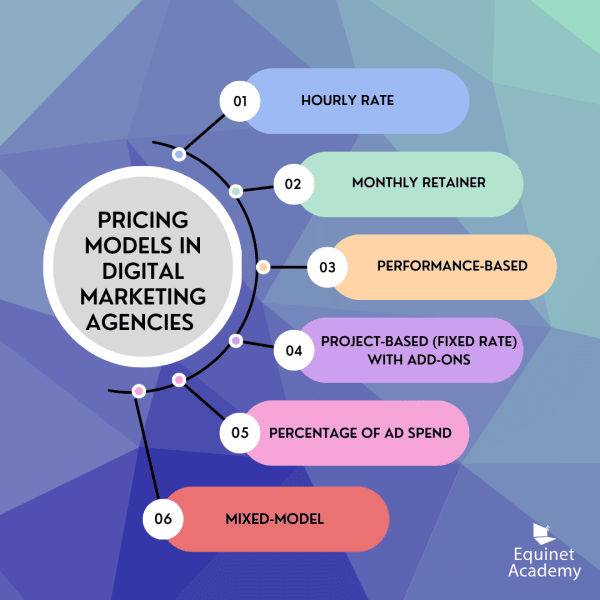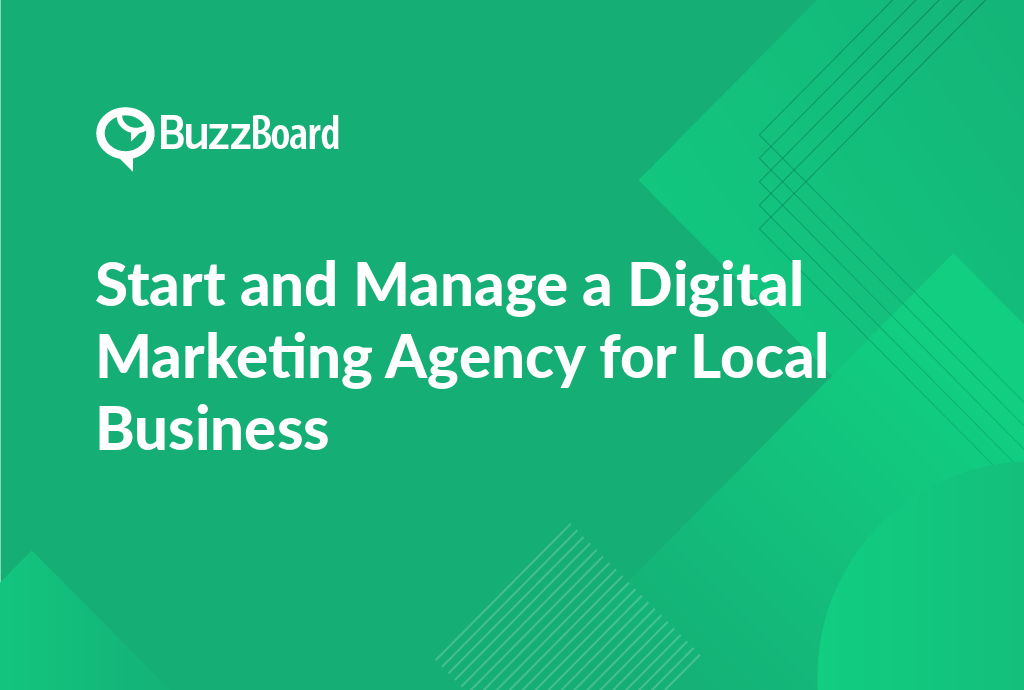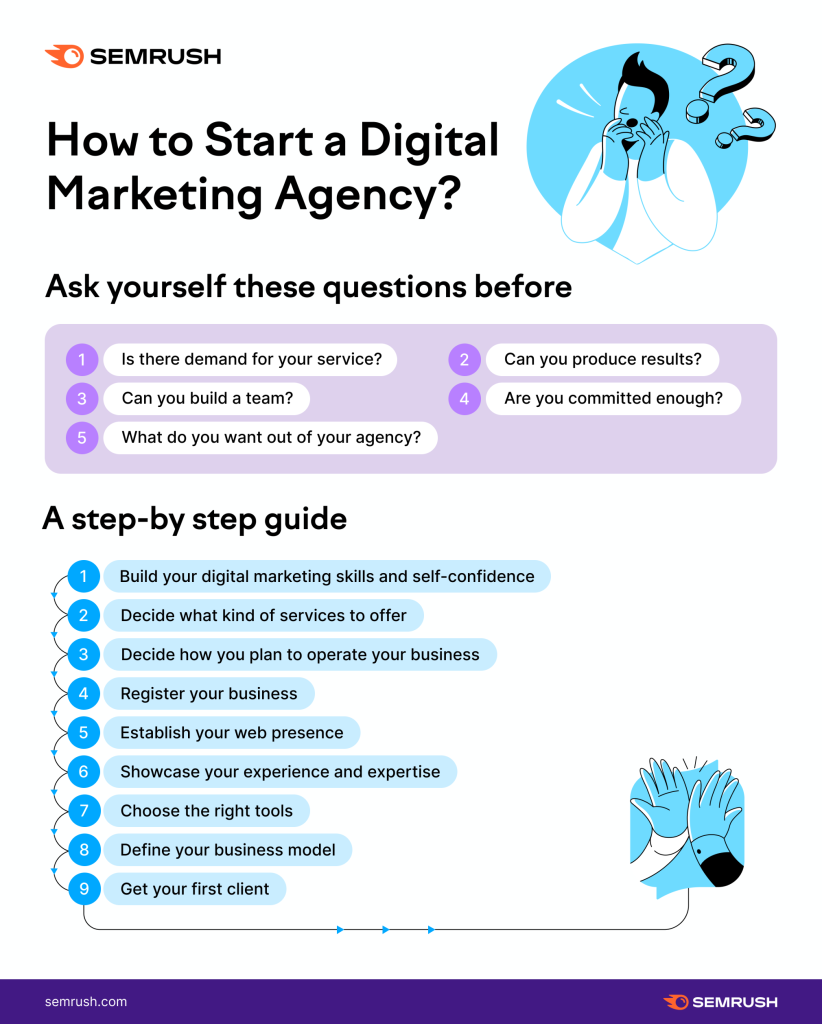Managing a digital marketing agency involves overseeing operations and strategizing for client success. Effective leadership and a clear business plan are essential.
Running a digital marketing agency requires a blend of strategic thinking and operational efficiency. Leaders must cultivate a deep understanding of digital trends and customer behaviors to deliver campaigns that resonate with target audiences. Success hinges on assembling a skilled team that can navigate the complexities of SEO, content marketing, social media, and data analysis.
To maintain a competitive edge, agency managers must prioritize continuous learning and adaptability, ensuring services evolve with the ever-changing digital landscape. Building strong client relationships through transparent communication and measurable results is also crucial for long-term sustainability. With the right mix of talent, technology, and tactics, a digital marketing agency can thrive in today’s fast-paced digital economy.
Introduction To Agency Management
Managing a digital marketing agency requires skill and knowledge. This guide explains the basics of agency management. You will learn about the role of digital marketing agencies and the challenges they face.
The Role Of Digital Marketing Agencies
Digital marketing agencies help businesses grow online. They use tools and strategies to reach customers. Agencies work on websites, social media, and ads. Their goal is to increase sales and brand awareness.
- Website development: Creating and improving websites.
- Social media management: Keeping up with posts and engagement.
- Online advertising: Running ads on the internet.
- SEO: Making sure websites show up in search results.
Challenges In The Digital Landscape
The digital world changes fast. Agencies must stay updated. They face several challenges.
- Keeping up with trends: Digital trends change often.
- Competition: Many agencies offer similar services.
- Adapting to new tools: New tools appear all the time.
- Measuring success: It’s hard to track what works.
Agencies must be flexible and creative to overcome these challenges.

Credit: www.equinetacademy.com
Setting Clear Goals And Objectives
Setting Clear Goals and Objectives is vital for any digital marketing agency. It aligns client expectations with agency deliverables. Goals guide strategies and measure success. They turn visions into actionable steps. Below are key ways to set and track these goals.
Defining Success For Your Clients
Success varies for each client. Agencies must understand this. Begin with a client meeting. Discuss their vision. Translate this into specific, measurable, achievable, relevant, and time-bound (SMART) goals. This sets a clear path for both parties.
Consider these factors:
- Brand awareness – Measure with social reach, website traffic.
- Lead generation – Track through sign-ups, downloads.
- Sales – Count online sales, in-store visits.
Internal Targets And Growth Metrics
Agencies also need goals. These goals drive growth and improve services. Internal targets should focus on:
- Service delivery – Aim for efficiency, client satisfaction.
- Team skills – Ensure ongoing training, development.
- Revenue – Set clear financial targets for sustainability.
Track these metrics:
| Metrics | Targets | Tools |
|---|---|---|
| Client retention rate | Improve by 10% annually | CRM software |
| Employee turnover | Reduce by 5% yearly | HR analytics |
| Profit margins | Increase by 15% per quarter | Accounting software |
Setting and reviewing goals regularly keeps agencies on track. It ensures client satisfaction and agency growth.
Building A Skilled Team
Building a skilled team is vital for any digital marketing agency. The right group of professionals can take your business to new heights. Let’s explore how to recruit and develop a top-notch team.
Recruiting Talent In Digital Marketing
Finding the right candidates begins with understanding the needs of your agency. Define the roles clearly. Look for candidates with a strong digital skillset and a passion for marketing. Utilize various platforms like LinkedIn, job boards, and industry meetups. Consider the culture fit; it’s as important as skills. Conduct interviews that test practical abilities. Use real-world scenarios to assess problem-solving skills.
- Post job openings on popular digital marketing forums and websites.
- Create detailed job descriptions that outline essential skills.
- Use social media to reach active and passive candidates.
- Implement an employee referral program for current team members.
Fostering Continuous Learning And Development
Encourage growth within your team. Invest in training programs. Workshops, webinars, and conferences can keep skills sharp. Offer opportunities for certifications. They boost both skills and morale. Promote a culture of knowledge sharing. Regular team meetings where insights and experiences are exchanged can spark innovation. Provide access to the latest tools and technology. This ensures your team stays ahead in the ever-evolving digital landscape.
- Organize regular training sessions to discuss new trends.
- Encourage team members to attend industry events.
- Allocate a budget for professional development courses.
- Implement mentorship programs within the agency.

Credit: www.equinetacademy.com
Leveraging The Right Tools And Technology
Leveraging the Right Tools and Technology is vital for a digital marketing agency. It streamlines tasks and boosts productivity. Agencies must choose the best software. This ensures teams stay ahead in a competitive landscape.
Essential Software For Efficiency
Choosing the right software is a game-changer. It simplifies complex tasks. Teams work smarter, not harder. Below is a list of must-have tools:
- Project Management: Keeps tasks organized.
- CRM Software: Manages customer relationships effectively.
- Analytics Platforms: Provides insights on campaigns.
- SEO Tools: Optimizes content for search engines.
- Email Marketing Software: Automates email campaigns.
- Social Media Management: Schedules posts across platforms.
Keeping Up With Technological Advances
Technology evolves fast. Agencies must adapt quickly. New tools can give a competitive edge. Below are tips to stay updated:
- Subscribe to tech blogs.
- Join digital marketing forums.
- Attend webinars and workshops.
- Test new tools regularly.
- Train staff on latest software.
Client Acquisition And Retention
Every digital marketing agency must master two core aspects: client acquisition and retention. These determine an agency’s growth and longevity. The right strategies can draw new clients while keeping existing ones happy.
Effective Strategies For Attracting New Business
Attracting new clients is crucial for any agency’s success. Here are proven methods:
- Optimize your agency’s website for search engines.
- Use social media to showcase your work and expertise.
- Offer valuable content, like ebooks or webinars, to engage prospects.
- Network at industry events and online forums to build connections.
- Create targeted ad campaigns to reach potential clients.
Maintaining Client Relationships For Longevity
Maintaining client relationships is key to an agency’s stability. Try these tactics:
- Deliver consistent results to keep clients satisfied.
- Communicate regularly with updates and insights.
- Provide exceptional service that exceeds expectations.
- Seek client feedback and act on it to improve services.
- Offer exclusive deals or discounts to loyal clients.
Data-driven Decision Making
In the world of digital marketing, data drives decisions. This approach helps agencies steer their strategies in the right direction. Let’s dive into how data-driven decision-making can transform your agency.
Utilizing Analytics To Guide Strategy
Analytics tools are your best friends. They show you what works and what doesn’t. Use these tools to understand your audience better. This helps you create more effective marketing campaigns.
- Google Analytics shows website traffic and user behavior.
- Social Media Insights provide data on engagement and reach.
- Email Marketing Tools track open rates and conversions.
By analyzing this data, you can adjust your strategies for better results.
Measuring Performance And Roi
Knowing your return on investment (ROI) is crucial. It tells you if your efforts are paying off. Focus on metrics that matter to your business goals.
| Marketing Channel | Key Metrics |
|---|---|
| SEO | Organic traffic, Keyword rankings |
| PPC | Click-through rate, Cost per click |
| Social Media | Engagement rate, Follower growth |
Use these insights to allocate your budget efficiently. Focus on channels that bring the best ROI.
Financial Management For Agencies
Financial Management for Agencies is key to success. Good management helps agencies grow and thrive. Let’s dive into how to manage your agency’s finances well.
Budgeting For Campaigns And Operations
Creating a budget is crucial. It guides your spending. You know where every dollar goes. This leads to smarter decisions.
- Set clear goals: Know what you want to achieve.
- Estimate costs: Look at past campaigns to guess future costs.
- Allocate funds: Put money where it will have the most impact.
- Review regularly: Check your budget often. Adjust as needed.
This approach ensures campaigns run smoothly without overspending.
Cash Flow And Revenue Optimization
Managing cash flow is essential. It keeps the agency running day-to-day. Here are tips to improve cash flow and revenue.
- Invoice promptly: Send invoices right after completing work. Faster payments improve cash flow.
- Monitor expenses: Keep an eye on spending. Cut costs where possible.
- Focus on high-margin services: Offer services that make more money. This boosts revenue.
- Use financial software: Tools help track finances better. They show where money comes and goes.
Good cash flow management ensures your agency stays healthy financially.
Navigating Legal And Ethical Considerations
Running a digital marketing agency involves understanding laws and ethics. Your agency’s success depends on these factors. Legal issues can lead to fines or business closure. Poor ethics can ruin your reputation.
Compliance In Digital Marketing
Legal compliance keeps your agency safe. Know the laws that apply. Data protection and privacy laws are crucial. They affect how you handle customer information.
- GDPR: Protects European citizens’ data.
- CAN-SPAM Act: Regulates email marketing in the USA.
- ADA compliance: Ensures website accessibility for all.
Create a checklist for compliance. Train your team. Use it in all campaigns. Stay updated with legal changes.
Ethical Standards And Reputation Management
Ethics guide your agency’s actions. They build trust with clients. Transparency and honesty are key. Misleading ads can destroy trust.
Develop a code of ethics. This code guides your team’s behavior. It should cover:
| Principle | Description |
|---|---|
| Honesty | Be truthful in all marketing. |
| Transparency | Disclose all ad relationships. |
| Respect | Value client and user privacy. |
Monitor your online reputation. Address negative feedback quickly. Use it to improve your services.
Innovative Campaign Strategies
Innovative Campaign Strategies are key for any digital marketing agency. They set you apart from the competition. Engaging content, creative designs, and smart use of data can make a campaign successful. Let’s dive into how to unleash creativity and learn from past wins.
Harnessing Creativity For Client Campaigns
Creativity is the lifeblood of standout campaigns. It turns good ideas into great results. Brainstorming sessions and creative workshops can spark this magic. Use bold visuals, compelling copy, and interactive elements to grab attention. Keep clients’ brand values in mind. Align these with innovative formats like VR or AR experiences.
- Identify the core message
- Explore various media formats
- Integrate interactive elements
Case Studies Of Successful Campaigns
Case studies showcase a campaign’s impact. They reveal strategies, execution, and results. Look at campaigns that won awards or went viral. Analyze their tactics and effectiveness.
| Campaign | Strategy | Result |
|---|---|---|
| Brand X’s Video Series | Storytelling & User Engagement | 50% increase in brand recall |
| App Y’s Hashtag Challenge | Social Media & Virality | 1M+ user-generated posts |
These examples prove that creative risks can pay off. They also show the power of social proof in marketing. Build portfolios around such case studies. They demonstrate your agency’s ability to deliver results.

Credit: www.buzzboard.ai
Scaling Your Agency
Expanding a digital marketing agency requires strategic planning and execution. Understanding when to grow and how to maintain quality is key. Let’s explore the essentials of scaling your agency effectively.
When And How To Expand Services
Identify client needs and market trends to determine new service offerings. Analyze your current capabilities and assess if they align with these opportunities. Consider the following:
- Demand: Are clients asking for more services?
- Expertise: Can your team deliver these effectively?
- Resources: Do you have the right tools and tech?
Plan for gradual expansion. Start with one or two new services. Track performance closely.
Managing Growth Without Compromising Quality
Quality is your agency’s backbone. To maintain it during growth:
- Hire right: Recruit skilled professionals who share your commitment to quality.
- Train teams: Ensure everyone understands your quality standards.
- Use tools: Implement project management and quality assurance software.
Regularly gather feedback from clients. Address issues promptly. This ensures continuous improvement.
Conclusion: Future-proofing Your Agency
Future-proofing your digital marketing agency is critical for continued success.
Adapting To Changes In Digital Marketing
Digital marketing evolves rapidly. New platforms emerge, and algorithms change. Stay ahead by learning trends and applying new strategies. Attend webinars and workshops. Subscribe to industry newsletters. Use analytical tools to track changes. Adapt services to meet these new demands.
Long-term Vision And Sustainable Practices
Think long-term. Build a sustainable agency with a clear vision. Prioritize client satisfaction and employee well-being. Adopt eco-friendly office practices. Use renewable energy sources. Reduce paper usage with digital files. Encourage remote work to lower carbon emissions. These practices attract clients and retain top talent.
Frequently Asked Questions
How Do I Structure My Digital Marketing Agency?
To structure your digital marketing agency, define clear roles and services, create scalable processes, invest in tools for efficiency, focus on niche expertise, and establish a strong online presence.
How Do You Manage Digital Marketing?
To manage digital marketing effectively, set clear goals, leverage analytics for insights, engage audiences through social media, create quality content, and regularly adjust strategies based on performance data.
Can One Person Run A Digital Marketing Agency?
Yes, a single person can run a digital marketing agency, focusing on core services and possibly outsourcing specialized tasks. It requires strong skills in marketing, time management, and client relations.
How To Scale A Digital Marketing Agency?
Scale a digital marketing agency by focusing on niche markets, leveraging automation tools, expanding service offerings, investing in talent development, and building strategic partnerships. Prioritize client retention and data-driven decision-making for sustained growth.
Conclusion
Managing a digital marketing agency requires a blend of strategy, adaptability, and a keen eye on evolving trends. By leveraging the insights shared in this post, you can steer your agency towards success. Remember, the digital landscape is always shifting—stay informed, stay agile, and keep your clients’ goals at the forefront.
Let’s harness these strategies and lead your agency to its full potential.


